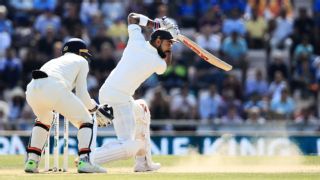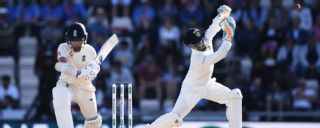|
CHOOSE YOUR OWN MATCH REPORT Construct your own wrap-up of the Southampton Test, and the series so far, by choosing one option to conclude each of the following sentences. [INSERT YOUR PERSONALISED BYLINE HERE] England secured a gripping series victory in the fourth Test in Southampton… (a) against the universe's No. 1-ranked Test team.
(b) against a side who had lost their previous seven away series outside the spin-friendly comforts of Asia and the Caribbean.
(c) against a team who will be haunted for some or all of eternity by their harrowing failure to close out at least one of two manageable chases in a series they could easily have won. India's bowlers… (a) put them in a position to win three of the four Tests so far, with superb collective displays of swing and seam, and well-executed plans.
(b) went slightly off the boil at key moments, at least twice more than would have been ideal.
(c) will probably regret not spending a little bit more time practising their batting - the collective series average of their Nos. 9 to 11 (4.00) is the currently fourth worst ever by any touring side in a series in England, while their Nos. 6 to 11 have managed to average a flaccidly unimpressive 11.05. With one Test remaining, this is the worst of the 58 touring teams who have played a series of four or more Tests in England since the Second World War, and the second worst by India in any series, beaten only by the 10.05 they managed in their 2002-03 defeat in a two-Test contest in New Zealand. England will be delighted… (a) by the staggeringly granite-stomached performance of Sam Curran (see below), the returning tweakery of Moeen Ali, the enduring wizardry of James Anderson, and the reawakening of Stuart Broad as a match-shaping force.
(b) that they have got away with it, frankly, despite their top four functioning as effectively as a watermelon in a Most Cuboid Object competition - their current collective series average of 18.92 is the third-lowest such figure in the 223 series of three or more Tests that England have played, although they will be expected to bat their way off that incompetently built podium at The Oval.
(c) that no one has suggested having a toss for the choice of ball, as well as whether to bat or bowl first, in Test cricket (or that Duke might like to work on developing a ball that does a little bit less, and Kookaburra on a ball that does a considerable amount more). England captain Joe Root… (a) has proved he has the leadership nous and mettle for the Test arena, holding his nerve under intense pressure in two brilliantly managed defences of small targets.
(b) must be up all night worrying about whether he can ever recover his world-beating form with the bat while enduring the pressures of captaincy.
(c) has already sent a letter to Father Christmas asking for some new opening batsmen.
(d) is slightly perplexed that there have not been more wild nationwide celebrations about the fact that his team have just become the first since England in 1981 to successfully defend a target of 250 or fewer twice in a series, and only the second to do so since the 1950s.  His Indian counterpart, Virat Kohli, meanwhile… (a) has shown incredible discipline not only in his batsmanship, but also in managing to refrain from standing on the dressing-room balcony and shouting, "For heaven's sake, were none of the rest of you paying attention four years ago?"
(b) has been seen scouring eBay for a time machine, to go back to June and make Jasprit Bumrah wear a magic protective thumb gauntlet in the T20 against Ireland.
(c) would probably have been delighted had a wizened old soothsayer predicted that India's top four wickets would average 43% more per partnership than England's (33.37 to 23.25).
(d) must be wondering what further depths of incompetence India's lower order are contemplating - India's 5th to 10th wicket partnerships have averaged 16.51, to England's 30.94. The England selectors will be particularly relieved… (a) that Man of the Match Moeen Ali scored crucial runs, became the first England bowler to take a five-for as the sixth bowler (or later) in an innings since Phil Edmonds against Australia in 1975.
(b) that Alastair Cook, by calling time on a monumental career after a prolonged slump, which has seen him reach 50 only five times in his last 42 Test innings, dating back to November 2016, has spared them at least one very awkward decision for the forthcoming winter tours.
(c) that Keaton Jennings chiselled out some highly valuable runs in the second innings, but had the decency to get out for 36, thus keeping alive the dream that this could be the first ever five-Test series in which no opening batsman has reached 50. (The lowest previously, in 168 series of five or more Tests, is three.) THE END. Well done. *** With the series now decided, all eyes naturally turn to the statistics, and there are some potential numerical nuggets waiting to unearth themselves in South London. Virat Kohli needs 56 runs to make 600 in a series for the fourth time
Kohli, currently on 544 runs for the series, more than twice as many as the second-most prolific batsman, Jos Buttler (260). If Kohli reaches the 600-mark, he will move into a clear second place behind Don Bradman in the Most 600-Run Series List. The Unstoppable Australian Run RobotTM topped 600 six times. Kohli is currently tied for second place with an illustrious trio of left-handers - Neil Harvey, Garry Sobers, and Brian Lara - and only 11 other players have reached that milestone twice in their careers (although Cook could join them if he makes a fairy-tale 491 not out in his valedictory Test innings). Fourteen different players have made 600 runs in a losing series - at The Oval, Kohli could become the first of these to do so twice, having made 692 runs in Australia in 2014-15. To give further context to Kohli's achievement, Sachin Tendulkar never reached the 500-run mark in a series (although he only played in three five-Test rubbers, and ten four-Test series). Viv Richards did not reach 500 in a series in the last 15 years of his Test career (despite playing 12 series of five or more matches in that time). Geoff Boycott and David Gower had only one 500-run series each. Four 600-run series would be a truly extraordinary achievement.  Furthermore, another half-century would make Kohli the first visiting batsman to reach 50 six times in a series in England since Brian Lara in 1995 (a six-Test series), and the first to do so in a five-Test series here since Keith Stackpole in 1972.
Furthermore, another half-century would make Kohli the first visiting batsman to reach 50 six times in a series in England since Brian Lara in 1995 (a six-Test series), and the first to do so in a five-Test series here since Keith Stackpole in 1972.
In 2011, after the futile magnificence of Rahul Dravid's three sumptuous and defiant centuries for MS Dhoni's whitewashed India against a superb English attack, I compiled a Defeated Heroes XI in a pair of blog postings on this site, comprising players who have had a personally glorious series in a heartily beaten team. Kohli is putting together an extremely strong bid for selection. He has almost papered over the chasmic faults in the Indian batting line-up. He has been at the wicket for 23 hours 17 minutes. Another hour in Birmingham and Southampton, and India would probably be 3-1 up. (M Vijay batted almost 25 hours in the 2014 series - his failure this time has been arguably the most costly of India's many and varied batting failures.) Sam Curran needs 65 runs to break the all-time record for most runs in a series batting at No. 8 or lower
Curran has made 251 runs so far, already the ninth-highest series aggregate for runs scored when batting at No. 8 or lower. Harbhajan Singh's record (315, for India in the three-Test home series against New Zealand in November 2010) is within sight, as is Moeen's Most-Runs-Batting-In-The-Bottom-Four-In-A-Series-For-England figure of 293, made in the 2015 Ashes. Curran has already tied Shaun Pollock's series record of four scores of 40 or more batting at No. 8 or lower (against West Indies in 2000-01). If Curran reaches 40 again at The Oval, he will tie the record for most 40-plus scores in a series by an England player batting six or lower, held by Bairstow (v Pakistan in 2016) and Flintoff (three times), which would be a tidy performance by a No. 8. Who is in his debut summer. At the age of 20. And who was left out of the one of the Tests. In a low-scoring series. In which he has twice come to the wicket with the score at 86 for 6, and made match-defining scores of 63 and 78. Not to mention the 46 vital runs made in the second innings in Southampton when England were in effect 151 for 6 in their second innings. All against an attack including a 300-wicket offspinner who averages less than 20 against left-handers. Without even factoring in that he has been the last wicket to fall in all five of England's innings in the three Tests he has played in, four of which dismissals were self-sacrifices in the cause of the team. Another potential Curran milestone
Another 31 runs would take Curran past Jack Crawford's record for most runs in a series by an England player under the age of 21 (he made 281 in South Africa in 1905-06). A pair of double-centuries would bring him close to George Headley's world record for runs in a Test series by an Under-21 batsman (703, against England in 1929-30). I'm not finished with him yet
If the Surrey allrounder takes two wickets on his home ground, he will become the second player in Test history to score 250 runs and take ten wickets in a series before his 21st birthday - Kapil Dev (329 runs, 17 wickets, against West Indies in 1978-79) was the first. Seven of Curran's eight wickets so far have been top-seven batsmen, the other was Ashwin, batting at No. 8. If England hand the wicketkeeping gloves to Alastair Cook, this will become the first series in England in which five different designated wicketkeepers have played
Both sides have changed their wicketkeeper, making this the first series in England to feature four different designated wicketkeepers since Pakistan's tour in 1996 (Jack Russell and Alec Stewart for England; Rashid Latif and Moin Khan for Pakistan). The difference in run-scoring by the two sides' glovemen has been one of the decisive factors in the series. Dinesh Karthik and Rishabh Pant have scrabbled together 64 questionable runs in eight innings - their combined series average of 8.0 is the lowest by Indian keepers since 1985 (five innings minimum). Bairstow and Buttler have made 296 in seven innings with the dagger by the names on the scorecard. If you include the 106 Buttler made after taking over the gloves for the last 66 overs of India's second innings in Nottingham, England have a 402-64 advantage in Runs By Keepers.
|

